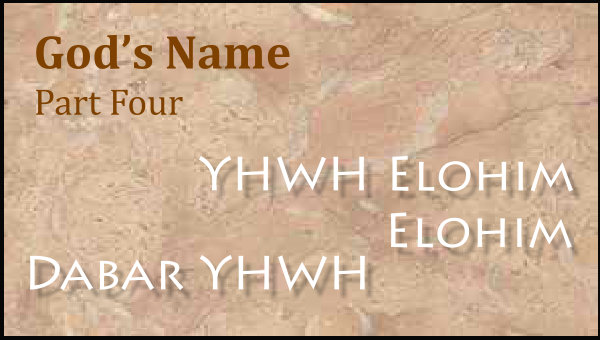By Tyson Thorne

Today we continue last week’s study of the names of God. Knowing God’s various names and their meanings can improve your prayer life and relationship with God. How can that be? Think of the names of God as a stark relief of God’s activities at the moment it is proclaimed. You may want to go back to yesterday’s post and re-read the names of God and visit the Old Testament references to see just what God was doing when that name came into being. This tells us something about the name itself, to be sure, but more importantly it tells us something about our Creator.
After all, if you can’t say you know a person unless you know their name, why should it be any different with God? Know God, know God’s names. It really helps when you want to call out to him in prayer. Since we finished with the compound names of God beginning with YHWH (Jehovah, or Adonai) we’ll start defining other names of God.
One of the oldest names for God is simply El, perhaps meaning “the strong one”, and pronounced with a short “e” as one would expect. We say “perhaps meaning” as there is some doubt among modern scholars that the formerly accepted root of this word is correct. Rather, it appears to be a generic word for God in many ancient languages including Hebrew, Aramaic, Assyrian, Phoenician, and some South-Arabian dialects. This name is used some 250 times throughout the Old Testament and is usually translated impersonally as “God”.
Like YHWH, El is used in a few compound names like El Elyon (el-el-yee-on) which means “the most high God (Genesis 14.20, Psalm 78.35, Daniel 4.34-35 and Isaiah 46.9-11); El Roi (el row-ee) meaning “the God who sees” (Genesis 16, Psalm 139.7-12); and El Shaddai (el shaw-die) meaning “the sovereign God” (Genesis 17.1-2, 28.3 and 35.1).
The most interesting El-related name in Scripture, however, may be Elohim (el-oh-heem). Used some 2,570 times in the Old Testament it appears to be the plural form of El which may indicate a high dignity as some Jewish language scholars suggest or may alluding to the Trinity as some Christians maintain. While the name YHWH was pronounced “Adonai” in public, when YHWH and Adonai appeared together they were pronounced Elohim giving further credence to the Christian point of view that more than one person but a single God may be in view. The word’s meaning is literally “the strong, covenant keeping God who creates and is faithful to his creation”.
In the first chapter of Genesis God is called Elohim. Early in the second chapter our Creator is named as YHWH Elohim. These names are used throughout the Old Testament but in chapter 6 of Genesis we are introduced to yet another name, Dabar YHWH which means “Word of God”. Dabar YHWH is used some 200 times in the Old Testament. Could these early name changes be indicators of the three persons of the Trinity? The Spirit that hovered over the deeps in Genesis one is Elohim, Dabar YHWH is Jesus as John claimed in in the first chapter of his gospel: “In the beginning was the Word, and the Word was with God and the Word was fully God.” Such an explanation, if true, would indicate the Father is YHWH Elohim. It’s an interesting idea, though there is no real evidence to prove its validity. Defining words and names are notoriously difficult the older the language.
Hopefully this series on the names of God has whet your appetite for more study and, more importantly, has shown you a side of our Lord that you didn’t previously understand.
|
|
